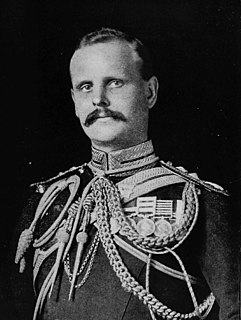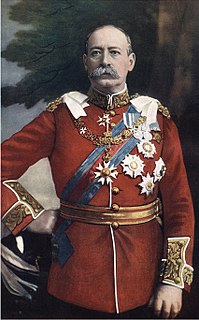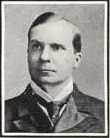Related Research Articles

London County Council (LCC) was the principal local government body for the County of London throughout its existence from 1889 to 1965, and the first London-wide general municipal authority to be directly elected. It covered the area today known as Inner London and was replaced by the Greater London Council. The LCC was the largest, most significant and most ambitious English municipal authority of its day.

Field Marshal William Riddell Birdwood, 1st Baron Birdwood, was a British Army officer. He saw active service in the Second Boer War on the staff of Lord Kitchener. He saw action again in the First World War as Commander of the Australian and New Zealand Army Corps during the Gallipoli Campaign in 1915, leading the landings on the peninsula and then the evacuation later in the year, before becoming commander-in-chief of the Fifth Army on the Western Front during the closing stages of the war. He went on to be general officer commanding the Northern Army in India in 1920 and Commander-in-Chief, India, in 1925.

Sir Edward John Poynter, 1st Baronet was an English painter, designer, and draughtsman, who served as President of the Royal Academy.

Henry George Percy, 7th Duke of Northumberland,, styled Lord Warkworth between 1865 and 1867 and Earl Percy between 1867 and 1899, was a British Conservative politician. He served as Treasurer of the Household under Benjamin Disraeli between 1874 and 1875 and was Chairman of the National Union of Conservative and Constitutional Associations from 1879 to 1883.

Field Marshal Francis Wallace Grenfell, 1st Baron Grenfell, was a British Army officer. After serving as aide-de-camp to the Commander-in-Chief, South Africa, he fought in the 9th Xhosa War, the Anglo-Zulu War and then the Anglo-Egyptian War. He went on to become Sirdar (Commander-in-Chief) of the Egyptian Army and commanded the forces at the Battle of Suakin in December 1888 and at the Battle of Toski in August 1889 during the Mahdist War. After that he became Governor of Malta and then Commander-in-Chief, Ireland before retiring in 1908.

Marcus Samuel, 1st Viscount Bearsted,, known as Sir Marcus Samuel between 1898 and 1921 and subsequently as The Lord Bearsted until 1925, was a Lord Mayor of London and the founder of the Shell Transport and Trading Company, which was later restructured including a Holland-based company commonly referred to as Royal Dutch Shell.

Colonel Sir Edward Ridley Colborne Bradford, 1st Baronet, was a British Indian Army officer who later served as Commissioner of Police of the Metropolis, head of the London Metropolitan Police, from 1890 to 1903.

Gavin Campbell, 1st Marquess of Breadalbane, styled Lord Glenorchy between 1862 and 1871 and known as The Earl of Breadalbane and Holland between 1871 and 1885, was a Scottish nobleman and Liberal politician.
Brigadier-General Sir Robert Gordon Gilmour, 1st Baronet,, born Robert Gordon Wolrige Gordon, was a British army officer and Captain of the Royal Company of Archers.

Sir William Job Collins, was an English surgeon, anti-vaccinationist and later a Liberal politician and legislator.
This is a list of sheriffs of Middlesex.
Major-General Edward Douglas Loch, 2nd Baron Loch was a senior British Army officer and peer.
Colonel William Vere Reeve King-Fane was an English local politician, magistrate and landowner, who served as vice-chairman of Kesteven County Council and High Sheriff of Lincolnshire.

Sir Charles Glynne Earle Welby, 5th Baronet, was a British civil servant who became a Conservative Party politician. He sat in the House of Commons from 1900 to 1906, and then had a long career in local government in Lincolnshire.

Sir Alfred James Newton, 1st Baronet was a British businessman. He was involved with the stock market flotation of several large privately owned retail stores, including Harrods in 1889 and D H Evans in 1894. He became Lord Mayor of London in 1900 and helped establish the City of London Imperial Volunteers who fought in the Second Boer War in South Africa. Mystery surrounds his death in 1921 from strychnine poisoning.

Lt-Col Henry Fishwick was a British soldier, politician and antiquary. After a military career, he became a Liberal Party Councillor (1871–1914) and twice Mayor of Rochdale (1903–05). He was also author and editor of several books on Lancashire and was a founding member of three of the county's historical societies.
Alfred George Lucas was an English first-class cricketer, businessman and British Army officer.
Sir Frank Green, 1st Baronet was a British businessman who was the 572nd Lord Mayor of London.
References
- ↑ "No. 25124". The London Gazette . 4 July 1882. p. 3121.
- ↑ "No. 23933". The London Gazette . 31 December 1872. p. 6526.
- ↑ The Times . 24 December 1883. p. 13.
{{cite news}}: Missing or empty|title=(help) - 1 2 3 "Obituary: Mr. Henry Clarke". The Times . 23 July 1914. p. 10.
- ↑ "The Guildhall Library". The Times . 29 November 1887. p. 10.
- ↑ "The Guildhall Art Gallery". The Times . 30 November 1897. p. 7.
- ↑ "The Lieutenancy of the City". The Times . 6 November 1887. p. 9.
- ↑ The County Councils - London Polls, The Times, January 18, 1889, p.9
- ↑ "London County Council". The Times . 13 March 1889. p. 6.
- ↑ "London County Council". The Times . 12 March 1902. p. 13.
- ↑ Jackson, W Eric (1965). Achievement. A Short History of the London County Council. London: Longmans. p. 258.
- ↑ "Metropolitan Water Board". The Times . 3 October 1903. p. 13.